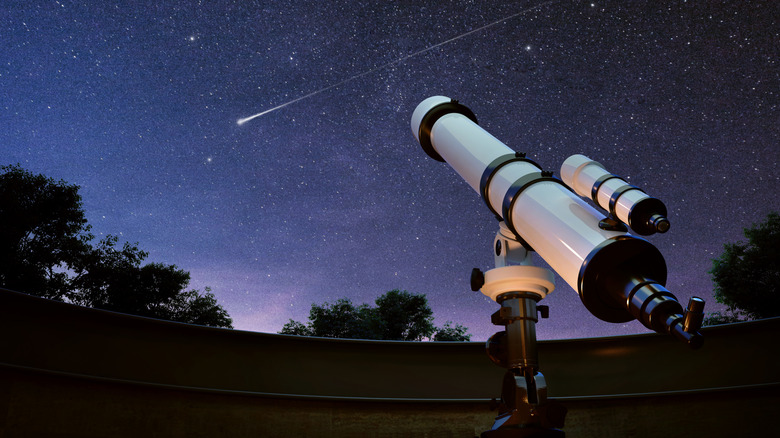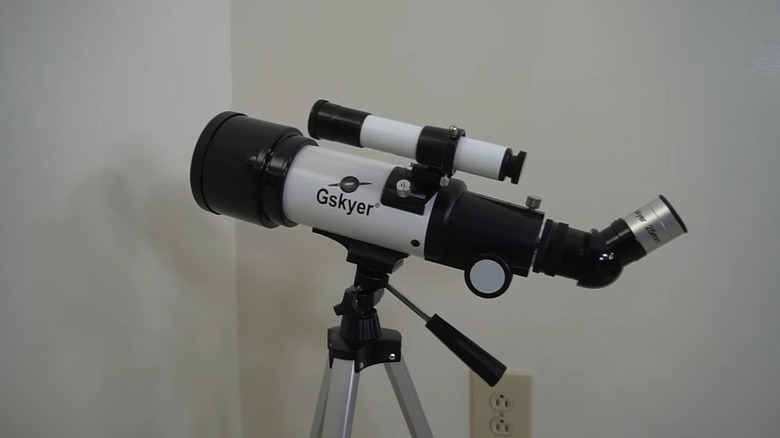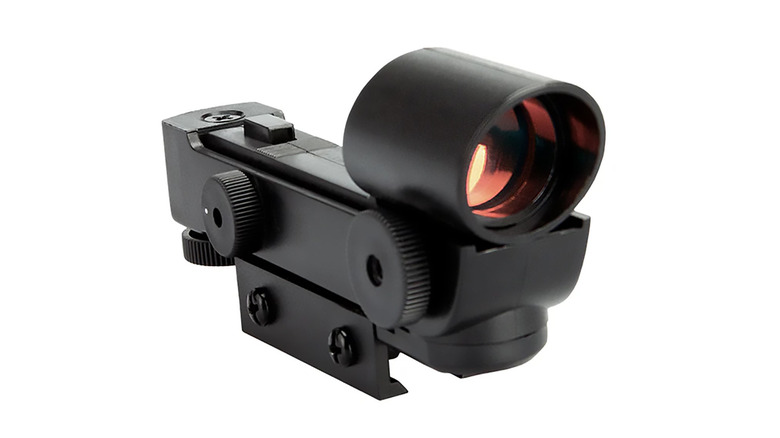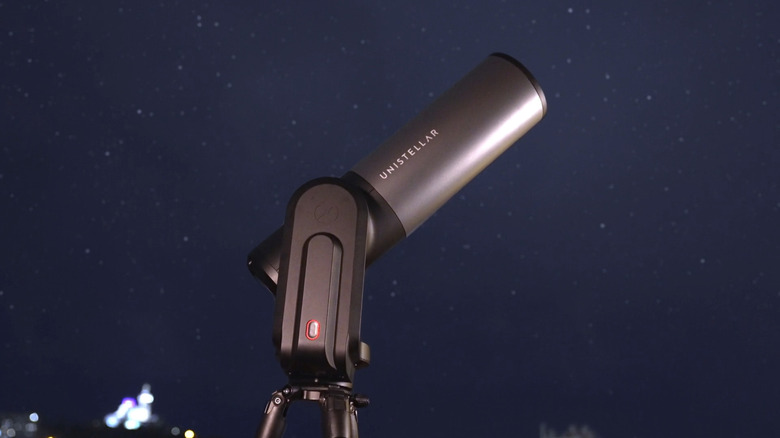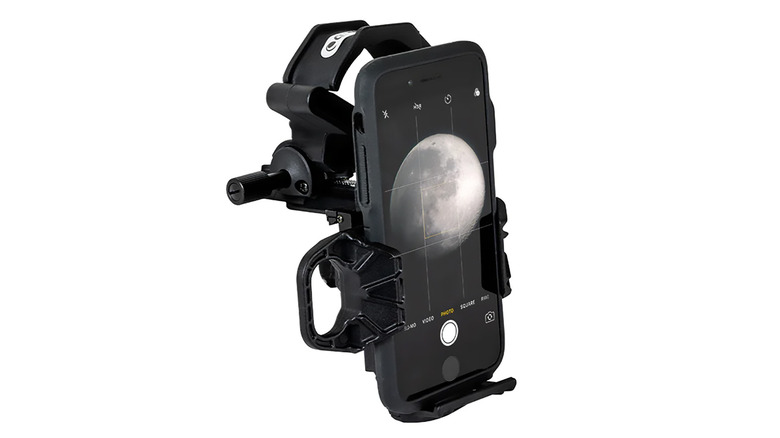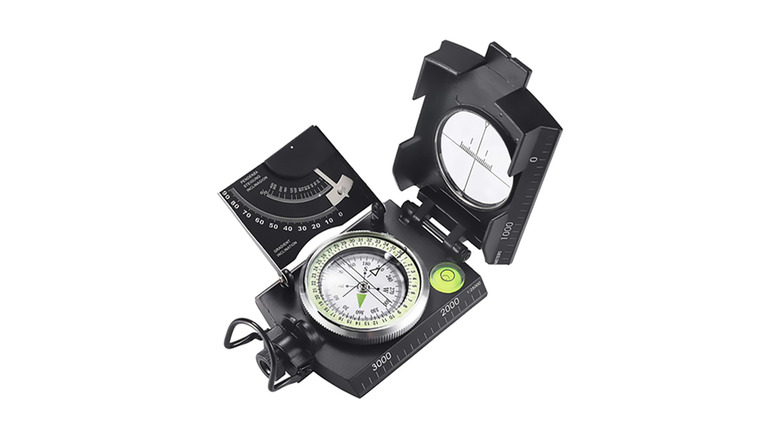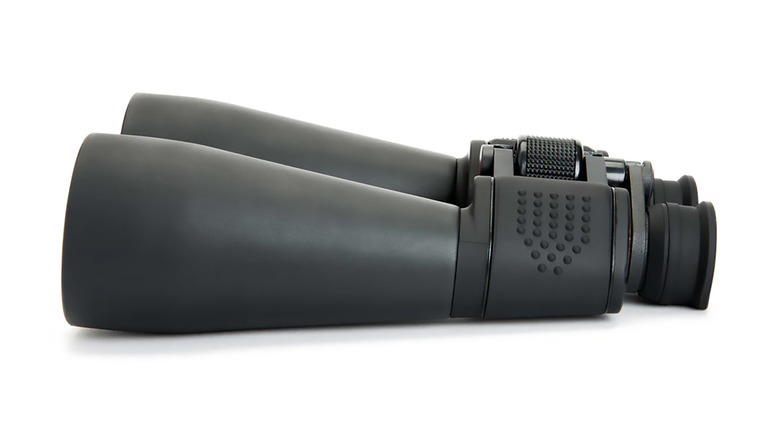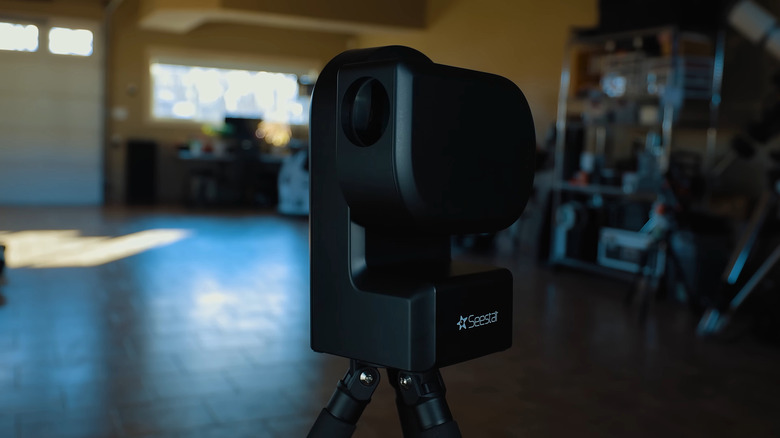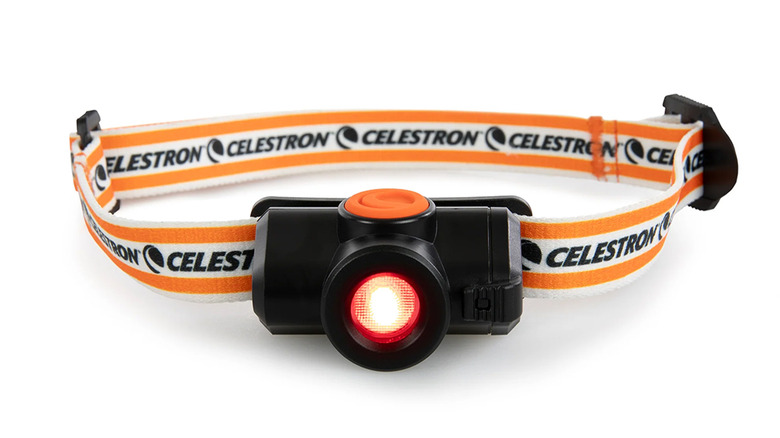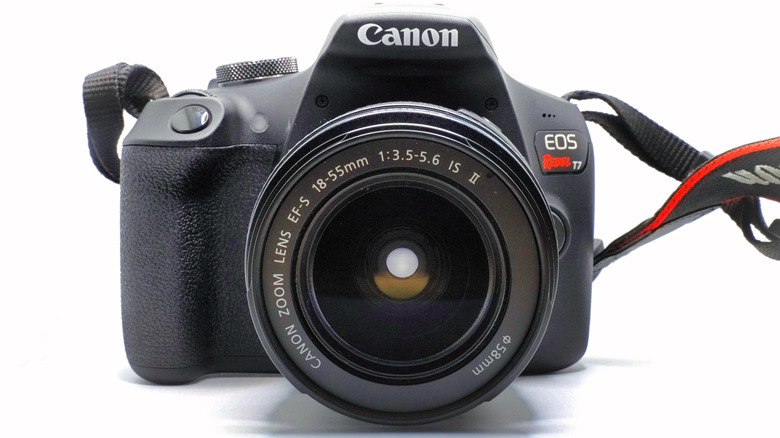10 Gadgets To Get You Started With Stargazing
We may receive a commission on purchases made from links.
As far as hobbies go, there aren't many that will leave you as stunned as stargazing. With countless celestial bodies and cosmic wonders that are now able to be viewed with consumer products, there's never been a better time to take up the hobby that'll have you staring at the night sky for hours on end. Alongside the long-standing telescope that has seen tremendous evolution over the years, there are plenty of other gadgets that can make the experience easier and more enjoyable overall.
Thanks to constant innovation and technological advancements, there are multiple ways for you to view the night sky in great detail. While some of the following products are geared towards enhancing specific items or tasks, some of which are their own individual gadget, these ten items are all readily available and can give you an extra helping if you're just starting out stargazing, whether that's through navigation, astrophotography, or ideal high-budget equipment.
Gskyer 70MM Telescope
When stepping into the world of stargazing, one of the first pieces of equipment that you'll most likely consider is a telescope. Being the staple device for this hobby, there's an incredible amount of choice for telescopes on the market in 2025, which, while giving us plenty of breathing room to find the best of the best, can make it tough to decide which is optimal for you personally. There are a lot of key components to consider when buying a telescope, not the least of which is the complications of setting one up, which is where this Gskyer telescope comes into the picture.
Gysker has countless products that are geared towards making stargazing accessible, with this 70 mm aperture telescope being one of the highlights. The size is great for beginners, providing great detail of easy-to-spot celestial objects like the Moon, all while keeping the costs down compared to those with better capabilities. Gsyker's telescope is currently available for $86.95 on Amazon or can be purchased directly from the brand's site for $89.99. Priding itself on being accessible for entry-level astronomers, you also get features such as a 3x Barlow lens for optimal magnification, a smartphone adapter, and a wireless camera remote control system for streamlined photography, as well as an adjustable tripod.
Celestron StarPointer Red-dot Finderscope
After purchasing your first telescope, there are a few optional additions that you can make to the essential piece of gear that can enhance your first venture into stargazing quite considerably. With most entry-level and mid-range telescopes, you'll be manually aiming at objects in the night sky, which can be tricky to adapt to at first. With standard telescope eyepieces not having a very wide field of view, a standard finderscope (which looks a lot like a small telescope) is a popular choice, but these gadgets can still be difficult to align with your target if you don't have much experience.
An easier and more affordable option to give you an introduction to more accurate alignment is a red dot sight, also referred to as a red dot finderscope, an attachment that's widely accessible. Celestron is one of the leading brands in the space, whether you're looking for a small device like this or a top-spec telescope, with the quality and customer satisfaction being consistent across most products. With no magnification, with this Celestron StarPointer red dot finderscope, you can keep your eyes on the sky to keep your bearings while still having a pointer to lock on to objects. Priced at $24.95 on Celestron's site and $23.95 on Amazon, it can add tons of practicality at an incredibly low price.
Unistellar Equinox 2 Smart Telescope
Thanks to the never-ending technological advancements within the field of astronomy, each year introduces new ways to observe the night sky as efficiently as possible. While traditional telescopes aren't set to go anywhere, a select few brands are contributing to the growing popularity of smart telescopes, which streamline the entire process of stargazing, only needing to input a few requests to receive ultra-clear images of the universe's beauty. Unistellar is one of these brands, offering a much more limited range of products compared to other key brands in the industry, but covering just as much ground with its telescopes. We've reviewed previous Unistellar telescopes in the past here at SlashGear, which we grew fond of quite quickly.
Released in 2023, the Unistellar Equinox 2 smart telescope is the ideal choice for a smart telescope if you're looking for an easy setup and top-tier imagery. Instead of looking through an eyepiece, the Equinox 2 requires you to connect to the telescope through the brand's app, which comes with an expansive database full of key celestial bodies, removing the need for manual alignment. This might not be to everyone's preference, but it acts as a great introduction if you don't have any experience with a telescope. However, due to the technology required to make the Equinox 2 run, it's pretty expensive. Costing $2,799, it's certainly in the high price range for the product, but with 35 five-star reviews, it is still a great choice if you have a higher budget.
Celestron NexYZ 3-Axis Universal Smartphone Adapter
Moving back to some of the more affordable products available to enhance your first time stargazing, this small yet massively effective piece, also from Celestron, can help you save quite a large sum of money by putting a device to use that most of us have on hand in 2025. Looking at the wonders of space through a telescope is a special experience in itself, but capturing what you see through the eyepiece can add a whole new element to stargazing: astrophotography. While an obvious choice is to go for a purpose-built camera to take these images, Celestron is one of many brands to offer a practical, cost-saving alternative.
Priced at $66.95 on Celestron's website, the NexYZ 3-Axis Universal Smartphone Adapter is compatible with telescopes that have a 1.25-inch or 2-inch eyepiece — the former being the most common size on the market. This adapter can also connect to monoculars, binoculars, and spotting scopes, meaning you have a tool for photography outside of stargazing as well, with most modern mobile phones having high-quality cameras built into them. To top it off, the brand's patented three-axis philosophy makes it easier to adjust your phone to the eyepiece for the most accurate shot possible.
Eyeskey Multifunctional Military Metal Sighting Navigation Compass
While a compass doesn't fall into the same high-tech category as other gadgets on this list, there aren't many pieces of gear that you can rely on more than a compass, particularly when it comes to direction and finding your bearings. Today, there are many apps and different software that provide accurate locations of anything from the International Space Station to planets to constellations to galaxies, which can be incredibly handy on the move. However, if for whatever reason the technology fails or you decide to go the old school route of using a traditional star map, a compass can be incredibly useful to help you find these celestial bodies accurately. Using the North Star as a starting point is a great idea, and, of course, it can help you stay on the right track when finding the ideal stargazing spot.
A standard compass could get the job done when aligned to a star map, but opting for a more heavy-duty option can provide more practicality for only a small increase in price. The Eyeskey Multifunctional Military Metal Sighting Navigation Compass is a standout pick with stellar reviews on Amazon, where you can purchase it for $27.99 at the time of writing. It's also available on Eyeskey's website for $41.99. This compass is also equipped with a sighting eyepiece, a sighting window, a clinometer to measure inclination, which can be crucial when setting up your telescope, as well as a luminous dial to help you read directions much more clearly at night.
Celestron SkyMaster 25x70mm Binoculars
If you're not yet in the market for a telescope and would rather have a more practical, versatile entry into stargazing, then a pair of purpose-built binoculars is the ideal choice. Costing less than many telescopes due to the lower complexity of the gadget, there's a decent amount of choice on the market, but once again, going for the well-established Celestron brand is the best way to make sure you're getting good value for money. The California-based brand offers a large selection of astronomy binoculars by itself, with the SkyMaster series being the overall enthusiast's favorite, with four to five stars on many of the varying products.
While not the cheapest pair, the SkyMaster 25x70 mm Porro binoculars cost $139.95 on Celestron's website and $109 on Amazon. The sizable 70 mm objective lens is also featured in the slightly cheaper 15x70 mm pair, but the 25 mm magnification goes the extra step, particularly when stargazing. These binoculars are also built with multi-coated lenses for better light transmission and are engineered for long viewing sessions. You won't get as clear a view of celestial objects compared to a telescope, but with no setup and increased portability, you can get an introduction to stargazing using a much more practical product. Alongside stargazing, you can also easily use these for camping and outdoor activities just as effectively.
Seestar S50 All-in-One Smart Telescope
If you like the sound of telescopes like the Unistellar Equinox 2 but don't want to be spending thousands of dollars on your first telescope, there are still choices out there for the cutting-edge technology at a lower price. While these telescopes will almost always be more expensive relative to standard entry-level telescopes, their ability to streamline stargazing is something that can't be overlooked if you'd rather skip the setup part of the process. Overall performance may be lower with more affordable smart telescopes, but the smaller size makes them far easier to carry.
One of the brands competing in the space is Seestar, particularly with the S50 all-in-one smart telescope. Priced at $549 on the company's website, this gadget certainly isn't cheap, but remains ultra-competitive within this area of the industry. With an aperture of 50 mm through its refractor and a focal length of 250 mm, the Seestar S50 is still capable of taking high-quality images of space in the designated stargazing mode, which follows the usual route of connecting the telescope to your device and tracking the various objects in the night sky. Weighing a mere 2.5 KG, the S50 is built to be taken anywhere.
Celestron FirstScope Signature Series Moon by Robert Reeves Telescope
After covering multiple attachments from Celestron, it's only right that we include one of its industry-leading telescopes in this list. Alongside telescopes stretching well into the thousands, Celestron also makes sure to produce some of the most accessible models on the market at a considerably low price, while offering a solid introduction to the hobby overall. One of the cheapest telescopes the brand offers in 2025 is the FirstScope Signature Series Moon by Robert Reeves, which takes the base telescope and adds a lunar image taken by the Celestron team member. If you'd like a different design, there's more available at varying prices.
Priced at just $74.95 on the company's website and $63 on Amazon, practicality is at the forefront of FirstScope. Celestron markets this telescope as the perfect choice for children, with no setup required apart from placing an eyepiece onto the device. Despite being small, it still offers 76 mm of aperture and a focal length of 300 mm. These capabilities, combined with its portability and low price range, make it an ideal choice to try out the hobby with clear views of the Moon before investing in a more heavy-duty telescope.
Celestron Night Vision Red LED Headlamp
As you'll be doing all of your stargazing at night, proper visibility is key, particularly if you're venturing out into less populated areas with lower light pollution. While there are many different tools you can use to light up your surroundings, the majority of everyday flashlights and torches come with white LED lights that can actually disrupt your vision at night and make it harder to adapt to the conditions.
Luckily, to combat this, multiple brands offer the solution of red LED headlamps, which are proven not to disrupt your natural adaptation to the lack of nighttime light the way that white lights can. Easily one of the most practical budget products comes from Celestron, which isn't much of a surprise considering how many of the brand's other products have made this list. Costing just $20.95, Celestron's Night Vision headlamp is made all the more practical by being hands-free, allowing you to keep all the attention on setting up your gear. You can also adjust the light at a 45-degree angle, and it lasts around 100 hours before needing a battery change.
Canon EOS Rebel T7
While mobile phones are a great way to get a start in astrophotography and easily store all of your images, purchasing a purpose-built camera is the next step if you want to capture the clearest, most stunning pictures of the universe possible. There are multiple brands for you to choose from when purchasing a camera, all with attractive options, including Nikon, Sony, and the brand we selected for this entry: Canon. One of the downsides of these cameras is their price points, with many easily exceeding the $500 mark. However, Canon offers a model that's not only cheaper but also a great choice for your first professional astrophotography camera.
The Canon EOS Rebel T7 is one of the more affordable DSLR cameras from the brand as a whole, with a current starting price of $479 at the time of writing from the brand's online store. Geared towards buyers with no or limited experience with DSLR cameras, the Rebel T7 can be attached to telescopes using an adapter (most likely a T-Ring) and can capture clear, detailed images of celestial bodies such as the Moon or further objects like constellations and star clusters. With an ISO range of 100 to 6400, this camera is more than capable of taking images in the dark conditions that stargazing naturally comes with.
